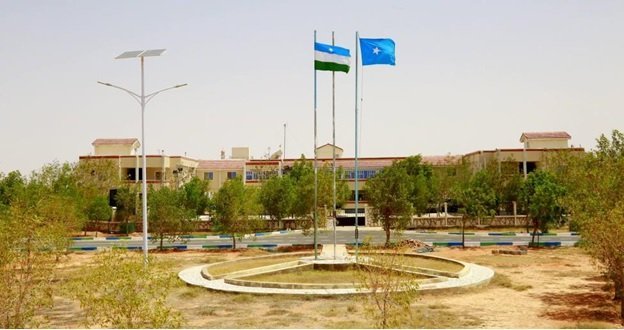By Abdikarim Haji Abdi Buh
A growing chorus of legal experts, political leaders, and civic voices are urging the Puntland State Government to reform its constitution to bring it into full harmony with the Provisional Federal Constitution of Somalia (PFCS), as mandated by Article 121, which states: “Principally, the Constitution of the Federal Republic of Somalia and those of the Federal Member States shall be harmonized.”
Puntland Constitution, first drafted in 1998 and amended in 2012, was written during a time of national instability when Somalia lacked a permanent federal government. Its authors, including former President Abdirahman Farole, acknowledged the document’s provisional nature. In its introduction, the amended constitution notes: “Since this constitution sets out the general structure of the Puntland Government, it will also impact other people in the Federal Republic of Somalia.” Yet, paradoxically, the document does not recognize the supremacy of the Federal Constitution—a fundamental requirement under Article 121.
At a recent legal policy conference in Garowe titled “Reviewing Regional and District Administrative Laws,” participants openly challenged legal contradictions in the Puntland Constitution that undermine Somalia’s federal structure. The discussion—rare in its frankness—focused on critical provisions regarding citizenship, sovereignty, and institutional alignment with the federal system.
Madam Saida Qacle, a senior advisor to the President of Puntland, openly criticized language in the constitution that implies a separate form of citizenship exclusive to Puntland. “It is odd to say that the Puntland Ministry of Interior is working on a Puntland citizenship law. Does the government not pay attention to what it is saying?” she remarked. “Eligibility to vote in Puntland is based on residency status of Somali citizens. Puntland is a Federal Member State. There is no legal or constitutional basis for creating a separate citizenship framework.”

Her criticism was directed at Article 39 of the amended Puntland Constitution, which states: “Any person who is a Puntlander by birth or who acquired the status of Puntlander in accordance with the law shall be recognized as a citizen of Puntland.” This provision appears to contradict Article 8 of the Federal Constitution, which recognizes only one Somali citizenship applicable to all citizens of the Federal Republic of Somalia.
Minister of Environment and Climate Change Mohamed Farole, in a pointed reflection, emphasized the importance of introspection and reform: “We cannot rectify the mistakes of the Federal Government of Somalia if we don’t rectify our own mistakes.”
The discussion also brought into question conflicting translations of the Puntland Constitution that refer to the “sovereignty” of Puntland—language that is in direct violation of Chapter 1, Article 1(2) of the Federal Constitution, which clearly states: “It is prohibited for a person or section of the public to claim the sovereignty of the Federal Republic of Somalia, or use it for personal interest.” Likewise, Article 3 underscores that “The sovereignty and unity of the Federal Republic of Somalia is inviolable.”
Legal analysts argue that any assertion of separate sovereignty by a Federal Member State is not only unconstitutional but also undermines the very fabric of Somalia’s unity and post-conflict state-building. These provisions were enshrined in the PFCS precisely to prevent fragmentation and the re-emergence of parallel state structures.
In this context, the Minister of Interior, Abdi Farah Said (Juha), deserves commendation for daring to raise the need for constitutional scrutiny. “Reform is not a threat to Puntland’s leadership or stability; it is a safeguard for our legitimacy within the Somali union,” a conference participant commented.
Despite these inconsistencies, Puntland’s electoral system has already accepted the federal definition of Somali citizenship in practice. In the 2023/24 local government elections, several successful candidates were Somali citizens from southern regions, indicating a de facto alignment with national citizenship laws.
This situation now places the responsibility squarely on President Said Abdullahi Deni to initiate a comprehensive constitutional reform process that brings Puntland’s foundational legal document into alignment with the Federal Constitution. This includes removing ambiguous references to Puntland’s “sovereignty” and reaffirming the region’s status as an integral part of the Federal Republic of Somalia.
Legal observers stress that without these reforms, Puntland risks isolating itself from broader federal processes, including revenue sharing, national security coordination, and the finalization of the permanent Somali Constitution.
“The stakes are high,” one constitutional scholar noted. “Failure to harmonize Puntland’s constitution with the federal framework could be interpreted as a de facto declaration of autonomy, which violates Article 1(2) and Article 3 of the PFCS. The international community, which has invested heavily in Somalia’s federalization process, will not support fragmented governance systems.”
The debate in Puntland offers a unique opportunity. Rather than viewing constitutional reform as a concession, Puntland can position itself as a leader in federal compliance and constitutional order. By amending outdated and conflicting provisions, it would send a powerful message to other Federal Member States and to Mogadishu: that the rule of law and federal harmony matter.
In the long arc of Somalia’s state-building journey, such a move would be historic—not only in setting legal precedence but also in demonstrating that Puntland continues to be a pioneer in governance reform, democracy, and national unity.
The constitution is not a static document. It is a living instrument that must evolve with the country’s federal trajectory. It is time for Puntland to uphold the spirit and letter of the Federal Constitution—and reassert its role not as a sovereign enclave, but as a pillar of the Somali federation.
Abdikarim Haji Abdi Buh
Email: abdikarimbuh@yahoo.com


Leave a Reply